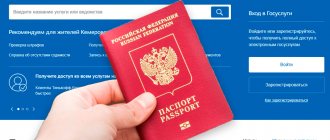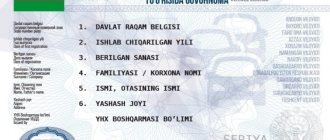The concept of deportation: how it happens
In modern law, deportation is recognized as one of the types of administrative liability for foreign citizens and stateless persons. Translated from Latin as “exile, expulsion.” The term is interpreted in Federal Law No. 115. In accordance with Article 2, deportation is the forced expulsion of persons who have lost the opportunity to legally reside in the territory of the Russian Federation.
The procedure may differ: the difference may be in the deportation procedure, in the decision-making bodies, in the appeal procedure, etc. The consequence is a temporary or permanent ban on entry into the Russian Federation.
The process of expulsion from Russia is divided into stages:
- The regional office of the Migration Council makes the decision.
- Certificates justifying deportation are sent to the court.
- The judge makes a decision.
- The migrant is deported.
During the initial expulsion, entry into the country is prohibited for 5 years, and during the second expulsion - for 10. A note indicating that entry is prohibited is placed on the migration card. In order for a person to be identified, a dactyloscopic procedure (taking fingerprints) is performed.
When is it necessary to check the timing of deportation?
The duration of an administrative ban on entry into Russia can vary: from 3 to 5 years, in some cases the punishment reaches 10 years.
An entry ban for 3 years is imposed on those persons who have been twice prosecuted for administrative violations, who have not been allowed to enter the Russian Federation for 3 years, and migrants who have been unofficially in the country for more than 120 days.
As soon as the authorities make such a decision, information about this appears in the information system of the Ministry of Internal Affairs, so you can find out about the deportation period from this department.
A five-year restriction can be received by foreigners who carried out illegal labor activities in Russia or violated the rules of stay in the country more than once within 12 months. Migrants who have received administrative penalties twice also face a five-year sentence.
A foreigner wishing to enter the territory of the Russian Federation who has concerns about his status should carry out a check in advance. If a person has been deported, he needs to clarify whether the deportation has ended or not.
Deportation and expulsion: what is the difference?
The main difference is that expulsion is an administrative punishment, and deportation is a measure of responsibility. The second is used in the absence of legal grounds for further stay in the country. Expulsion is also applied if there are reasons for staying, but if the migrant commits a crime. Its purpose is to ensure national security, maintain health, etc.
The decision on deportation is made by the migration authority, on expulsion - by the court. Deportation is carried out forcibly; expulsion is also possible independently.
Features of deportation from the Russian Federation
The final decision is made at the state level. Peculiarities:
- if the length of stay of a foreigner is shortened, he must leave the Russian Federation within three days;
- When canceling documents, the departure time is increased to 15 days;
- Before deportation, the citizen is placed in a special institution.
The procedure is carried out at the expense of the deportee. If he does not have finances - for the money of the inviting party or the consulate.
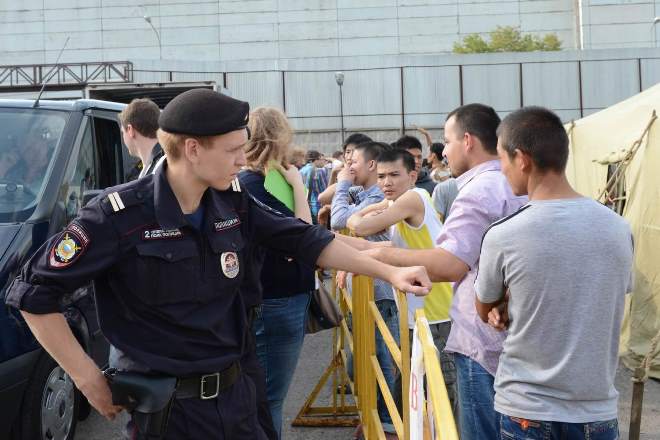
The main reasons for the ban on entry into the Russian Federation
The entry ban for residents of the CIS and other foreign countries is a government measure aimed against violators of the law. The reasons for the restrictions are the same. Before entering the Russian Federation, it is necessary to check deportation records for previous years. Reasons:
- committing administrative violations;
- exceeding the permissible period of stay in the country;
- lack of some documents;
- providing false information about yourself and the purpose of the trip;
- failure to comply with entry conditions;
- having a criminal record;
- exceeding the maximum period of temporary residence permit;
- providing a false passport;
- evasion of taxes and fines.
This list of reasons is incomplete - there are also political sanctions.
How to check if a person has been deported from Russia?
For many foreigners, deportation becomes an unpleasant surprise already at the airport. Many people themselves do not know that they have committed an offense and do not attach the necessary importance to the deadlines, which leads to the cancellation of migration patents and a decision on deportation. To check whether a person has been deported from the Russian Federation, you need to write an official request to the Main Directorate for Migration of the Ministry of Internal Affairs of Russia with a request to indicate the presence or absence of an entry ban, if there is one, the reason, validity period, clarify the terms of deportation, indicating the date of deportation, or do this through a special service on the website of the Office of Migration Issues. But it is worth remembering that if in the first case the answer is official, then in the second the information is considered for informational purposes and has no legal force. Therefore, in order to quickly pass customs control and avoid unpleasant situations, it is better to contact the GUVM with a written application (and, if necessary, present it at the border). Sometimes, even when the expulsion deadline has passed, the entry ban has not yet been lifted - most often due to an unpaid fine, a match in the border guards’ last name, first name, patronymic (or when the data has not yet been updated).
Personal appeal to the Main Department of Migration Affairs of the Ministry of Internal Affairs
To send an official written request, you need to find the contacts of the regional office of the GUVM (they are on the website), write a letter clearly stating the request and send it via Russian Post by registered mail with return receipt requested (the receipt of payment must be kept). It is important to indicate the return address, data that will objectively and holistically describe the situation: personal information, citizenship, passport data, information about previous passports, dates and places of border crossings, dates of previous deportations, documents (they can be attached either electronically or sent by mail).
It is also possible to bring your appeal in person to the Reception Office of the Main Department of Migration Affairs of the Ministry of Internal Affairs (in Moscow at Verkhnyaya Radishchevskaya St., building 4, building 1). Detailed information on the reception procedure can be found in Federal Law No. 59-FZ dated May 2, 2006 “On the procedure for considering appeals from citizens of the Russian Federation”, Order of the Federal Migration Service of Russia dated March 21, 2014 No. 208 “On organizing work with appeals from citizens and organizations in Federal Migration Service and its territorial bodies." The appeal is registered no later than 3 days and sent for consideration. The response must be sent no later than 30 days from the date of registration (the authorized person may extend it for a similar period, of which the applicant will be notified). If the appeal indicates facts of violation of the law in the field of migration, the letters are considered within 20 days. This may be refused if personal data or a return address are not indicated, the text is written illegibly, or if the application is considered unfounded. When composing an email, it is important to take into account some nuances, the observance of which will minimize the likelihood of refusal:
- Only valid data must be provided;
- do not copy a message that has already been sent;
- it is necessary to analyze the contents of the application (if a personal signature or original documents are required for its consideration, it is better to apply in person);
- the system will not automatically accept an appeal written in Russian in Latin letters (or if the text is typed in capital letters and is not divided into separate sentences).
See also: How can Russian citizens obtain a visa to Bulgaria?
Checking via the Internet
To clarify the status of a person and find out whether he has been deported from Russia, you need to go to the website of the Main Directorate for Migration Issues of the Ministry of Internal Affairs of Russia and select the section Online services – Services on migration issues – Checking the existence of grounds for not allowing entry into the territory of the Russian Federation for foreign citizens and persons without citizenship through the Ministry of Internal Affairs of Russia. In the form you must indicate:
- surname, first name, patronymic;
- floor;
- date of birth;
- citizenship;
- type of document (foreign biometric, old-style international passport, national passport), its number, validity date, issuing country or organization;
- Enter the code from the picture to protect your data.
Then click “Send request”. If necessary, you can ask a question by clicking on the “Ask a Question” link (on the same page). It is important to remember that answers should be taken as informational information. To obtain official data that will have legal force, you need to contact the department of the Ministry of Internal Affairs at your place of residence. A few seconds after sending the request, information will appear about the presence or absence of grounds preventing entry into the Russian Federation through the FMS. If there are any, information will be displayed about which region initiated the entry closure. You can also receive a response through the electronic Message Reception Service of the Ministry of Internal Affairs by selecting the division - Main Directorate for Migration Issues, but the response will not have legal force.
Violations that lead to deportation
Deportation applies to foreign citizens and stateless persons who have committed certain offenses. Their list:
- stay without a visa or temporary residence permit;
- committing a crime of medium gravity: forgery of documents, fictitious marriage, prostitution, etc.;
- encroachment on public order and safety: hooliganism, illegal activity, sale of weapons, etc.;
- committing a serious crime: crime, drugs, transportation of illegal immigrants;
- unpaid fines in Europe;
- work without a patent;
- detention when crossing the border for giving false information.
Children under 16 years of age are not subject to deportation in most situations. But they can be deported if their parents are in the country illegally.
How to find out the deadline for deportation from Russia
In most cases, legal practitioners agree that deportation is used in cases where a foreigner has no reason to stay on the territory of the Russian Federation or there are reasons for forced deportation in accordance with the norms of Federal laws. But expulsion is used as a punishment in case of an administrative violation (regulated by the Code of Administrative Offenses of the Russian Federation). These processes are implemented by separate executive bodies; decisions on them are made for various reasons. Advantages of deportation as a measure to control the migration order in the country:
- Promotes migration order.
- Prevention of crimes and administrative offenses by foreigners and stateless persons.
Deportation is not an administrative form of punishment; it is used as a measure of state coercion.
Deadline for deportation from Russia
- Identification of diseases that pose a threat to public health, in particular HIV infection.
- Making a decision on the undesirability of a foreign citizen’s stay on Russian territory (if he poses a danger to society).
- See also: Applying for a visa to the Canary Islands - features and nuances Since the concept of deportation is often identified with the term “administrative deportation”, it is worth paying attention to the following reasons for deportation:
- violation of the regime of the State Border of the Russian Federation, the checkpoint through it;
- failure to comply with entry or residence rules;
- illegal labor activity;
- failure to comply with immigration rules;
- provision of false data during migration registration.
How to check if a person has been deported from Russia? For many foreigners, deportation becomes an unpleasant surprise already at the airport.
How to find out whether a foreign citizen from the Russian Federation is deported or not
- Committing actions that entail administrative liability more than twice;
- Illegal employment;
- Secondary deportation;
In addition, if deported again, a foreign citizen may be issued a large fine, and the period of deportation may be doubled (up to ten years). Ways to check deportation To ensure that information about your own deportation does not “pop up” at the most inopportune moment (when applying for a job, traveling on a vacation, buying an air ticket), it needs to be checked from time to time.
A foreign citizen can check information about his status in two ways:
Decision on deportation: who makes it, procedure, registration, deadlines
The number of migrants and their stay is controlled by the Main Division for Migration Issues of the Ministry of Internal Affairs (formerly the FMS). This service has a database that contains information about visitors, the validity periods of their permits and work patents. The decision on deportation is made by the Main Directorate for Migration of the Ministry of Internal Affairs.
An agency employee prepares documents for expulsion, makes requests and carries out other actions related to expulsion. The result of the consideration is a resolution. The federal migration authority must notify the citizen. A deportation mark or a stamp banning visiting the Russian Federation is placed in the international passport. The terms of restrictions range from three to 10 years. A person must leave the country within 5 days after the decision is made.
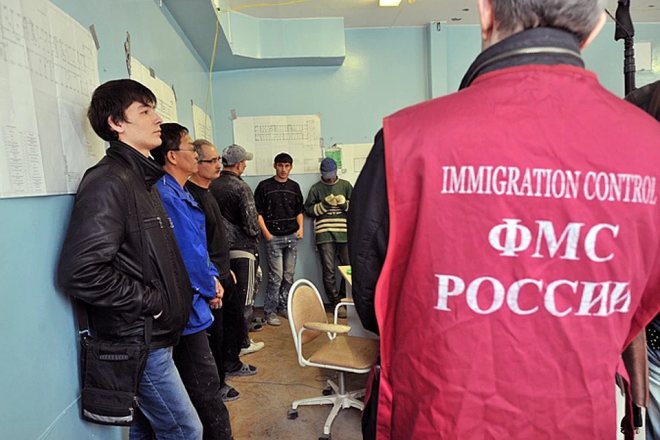
How and where to find out about deportation
Deportation verification is carried out in two ways:
- The deportee has the right to personally contact the representative office of the Federal Migration Service at his location.
- Check deportation via the Internet using an online request on the official website of the Department of Migration of the Ministry of Internal Affairs of the Russian Federation.
This is interesting: Is it possible for a foreign citizen to live at a location other than his place of registration?
Why can they be deported?
The reasons for deportation, as well as its timing, may be different. Deportation for three years if:
- the migrant has violated the rules of registration in the Russian Federation and has been staying illegally for more than 90 days;
- failure to comply with the provisions of the Administrative Code of the Russian Federation more than once.
Deportation for five years if:
- the regulations on the preparation of documents giving the right to stay in the Russian Federation for 1 year have been violated repeatedly (more than twice);
- the person has already been expelled from the country at least once;
- the administrative code was violated more than 2 times;
- illegal employment was officially established.
In some cases, the entry ban can be increased to 10 years (if the migrant is repeatedly expelled).
Cases when deportation can be avoided
There are certain categories of persons who cannot be deported. This applies to refugees and citizens who have asked the government authorities for political asylum. Even if the petition is considered, they cannot be expelled from the country. If the decision on granting status or asylum is negative, and there are no other legal grounds for stay, the foreigner will be deported.
Employees of diplomatic and consular departments are not subject to deportation. Deportation does not apply to persons who have lost refugee status, but have managed to prove that persecution awaits them in their home country. Regardless of the reasons, they have the right to ask for the expulsion to be lifted.
Compatriots need not be afraid - according to regulations, deportation applies only to foreign citizens. But the authorities sometimes make exceptions.
The legislative framework
When considering the issue related to deportation, it is important to rely on the legislative acts of the Russian Federation. The main provisions are recorded in the following regulatory documents:
- Code of Administrative Violations - Article 3.10;
- 114 Federal Law of 1996 - on the rules and procedures for entering the territory of Russia;
- 115 Federal Law of 2002 - on the legal status of foreign citizens in the Russian Federation.
These regulations state that deportation is used as one of the last resort measures. In most cases, we are talking about situations where the presence of a foreigner in our country is no longer acceptable.
Article 3.10 of the Code of the Russian Federation on Administrative Offenses “Administrative expulsion from the Russian Federation of a foreign citizen or stateless person”
Federal Law of August 15, 1996 No. 114-FZ “On the procedure for leaving the Russian Federation and entering the Russian Federation”
Federal Law of July 25, 2002 No. 115-FZ “On the legal status of foreign citizens in the Russian Federation”
More on the topic Fine for stopping at a public transport stop in 2021, for parking and parking
How to find out about the deportation of a foreign citizen from Russia: verification methods
To prevent foreign citizens from unexpectedly canceling their trip to Russia, it is important to know how to check for deportation. This must be taken care of in advance. Checking deportation is possible in several ways: via the Internet on the FMS website and by personally contacting the service department. Checking the deportation of foreign citizens online is for reference only; you should not rely entirely on the results.
A more accurate option for checking deportation is to submit a request to the Ministry of Internal Affairs of the Russian Federation. You can apply for verification in person or through a representative. To ensure an official response, it is important to submit a written application.
You can check whether a person has been deported from Russia by visiting the FMS office. It is important to know that you need to contact the department at your place of residence. The applicant makes a written application addressed to the head of the service and indicates basic personal data:
- FULL NAME;
- gender;
- date of birth;
- passport details;
- citizenship.
The answer is issued after 10 days.
Checking deportation through the FMS website provides more accurate information. The official website of the service provides introductory information, which will need to be confirmed with the local unit.
To check deportation on the FMS website, you need to find the appropriate section and enter the data in the form that opens:
- last name and first name;
- surname;
- floor;
- Date of Birth;
- data from a passport - foreign, internal or biometric (for Ukrainians);
- citizenship.
After entering the information, you will need to rewrite the digital code indicated next to it and send the request. If the answer is negative (no deportation), the answer comes instantly.
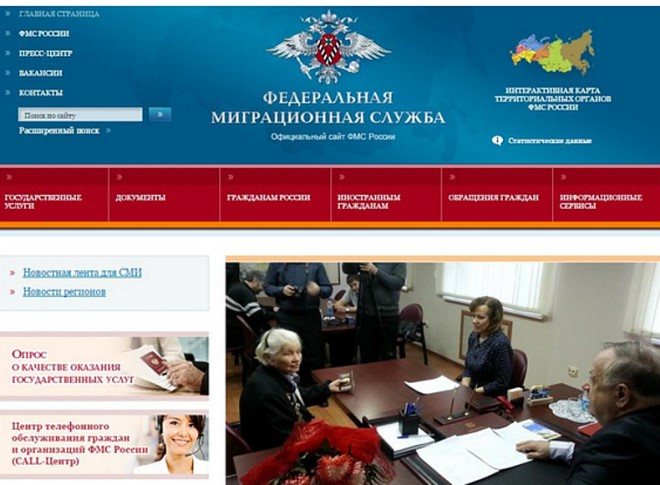
How to find out about the ban
Data verification and banning are carried out by the following Russian government authorities:
- Federal Security Service;
- Main Directorate for Migration Issues of the Ministry of Internal Affairs of the Russian Federation;
- Ministry of Internal Affairs;
- Foreign Intelligence Service;
- Rospotrebnadzor.
On the website of any of the above government bodies, you can consider in detail the general procedure for making decisions. In 2013, the migration service launched a service, using which you can check whether there is deportation from Russia or not. Thanks to this service, any foreign citizen will be able to clarify information that will allow him not only to change his travel plans in advance, but also to save on tickets.
The Main Directorate for Migration Affairs of the Ministry of Internal Affairs may cancel deportation if there are the following reasons:
- During treatment.
- Possession of a patent.
- If you plan to receive education through a stationary route.
- If there are relatives who are Russian citizens officially and permanently reside in the country.
- If you have a work permit.
In any case, it is best to double-check the information in advance before traveling.
Cancellation of deportation: when is it possible?
Forced deportation from a country is not always legal; deportation can be reversed. Reasons based on which you will be able to stay within Russia:
- residence in the territory of the Russian Federation of a close relative who has citizenship;
- availability of a document giving the right to employment;
- studying at a university in the country;
- availability of residence permit;
- undergoing treatment in a medical institution.
The presence of at least 1 reason does not guarantee automatic cancellation of deportation. The right to stay in the country must be documented. Only the court can revoke an expulsion.
Reasons for deportation
You can receive a ban on entry into the territory of the Russian Federation for a three-year period if you commit the following violations:
- Staying on the territory of the Russian Federation without documents confirming the right to temporary residence for more than four months;
- Committing actions that entail administrative liability more than once;
You can receive a ban on entry into the territory of the Russian Federation for a five-year period if you commit the following offenses:
| Dear visitors! The site offers standard solutions to problems, but each case is individual and has its own nuances. |
| If you want to find out how to solve your particular problem, call toll-free ext. 504 (consultation free) |
- Repeatedly ignoring the need to complete documents required for legal stay in the country for twelve months;
A “multiple” action is an action that has been repeated more than once in the past year.
- Committing actions that entail administrative liability more than twice;
- Illegal employment;
- Secondary deportation;
In addition, if deported again, a foreign citizen may be issued a large fine, and the period of deportation may be doubled (up to ten years).
Appealing deportation decisions
If a person is sure that he was expelled illegally, he has the right to appeal the decision in court and have his deportation lifted. The procedure is allotted 3 months from the date of familiarization with the decision. Pre-trial appeal is allowed by submitting an application to the head of the Ministry of Internal Affairs. If the claim is not satisfied, you must contact a higher authority within 10 days.
To do this, an administrative application is submitted to the court at the location of the FMS branch. Upon written request, deportation may be postponed during the trial. If the judge accepts the foreigner’s position, the deportation will be canceled.
Financing the deportation procedure
The imposition of deportation implies that foreigners will bear the financial costs of leaving. If it is impossible to recover the amount from the violator, the invoice is presented to the country from which he arrived. Other sources of funding for the return trip:
- inviting party (individual or legal entity);
- diplomatic department of the country;
- budget of the Russian Federation.
An agreement on readmission was signed between Russia and Kyrgyzstan - residents of Kyrgyzstan will be deported at the expense of the Russian Federation.

Checking deportation through the FMS website
First you need to understand the concepts.
Certain categories of persons are not deported.
Because when they talk about the deportation of foreign citizens, they use two terms - “administrative expulsion” and “deportation”. There is a definite difference between them, although sometimes it can be difficult to identify. Thus, there will be no need to check whether a refugee or a person who has asked for political asylum in Russia is deported.
- Fill out the electronic form on the portal page of the Main Department of Migration Affairs of the Ministry of Internal Affairs.
- Check that the information is entered correctly and that all items are completed.
- Click the “Send request” button.
It is clearly stated right on the website that the online deportation check for foreign citizens does not provide information that has legal force.
At the same time, visitors are warned that sending a request means consent to the processing of personal data.
These are Rospotrebnadzor, the Ministry of Justice, the Ministry of Internal Affairs, the Foreign Intelligence Service of Russia, the FSB, and the Financial Monitoring Service. There are two types of restrictions:
- Entry ban from the Russian Federation; Resolution on the unwanted stay of a foreigner in the Russian Federation.
The reasons for the ban may be different, but usually they are associated with a violation of Russian legislation: It happens that restrictions are imposed for security reasons and for the purpose of defense of the country.
- There is no ban on entry into the Russian Federation; There is a restriction on entry (terms are indicated - 3, 5 or 10 years).
It is better to check your status on the FMS website in advance, even before your visit to Russia, this will allow you to avoid an unpleasant situation at the border.
Restrictions for 3 years await a foreigner if he: Illegally
What other sanctions are there for violations of immigration laws?
Most enterprises use the labor of foreign workers from Tajikistan, Uzbekistan, Moldova and other countries. Often employers violate immigration laws, as a result of which they are subject to a fine. Causes:
- failure to conclude an employment contract with the employee;
- lack of a complete package of documentation;
- attracting migrants to work without registration;
- hiring without a patent;
- failure to notify the FMS;
- non-compliance with labor protection requirements, etc.
Violation of the rules entails a fine for both the employer and the migrant. The fine ranges from two thousand rubles to 1 million, depending on the type of violation and the status of the employer (legal entity or individual).
Thus, before leaving for the Russian Federation, you need to check yourself on the list of deportees. You can view the information on the official website of the Ministry of Internal Affairs. You can find out information in another way - by personally visiting the migration service.
How to find out how many years you were deported from the Russian Federation
This can be done online, on the website of the Main Directorate for Migration Affairs of the Ministry of Internal Affairs, or by sending a request there. In fact, the procedure is the same as what you need to follow to find out if you have a ban on entry into Russia.
On the Internet
You need to go to the official website of the Main Directorate for Migration of the Ministry of Internal Affairs of Russia and find the appropriate service there.
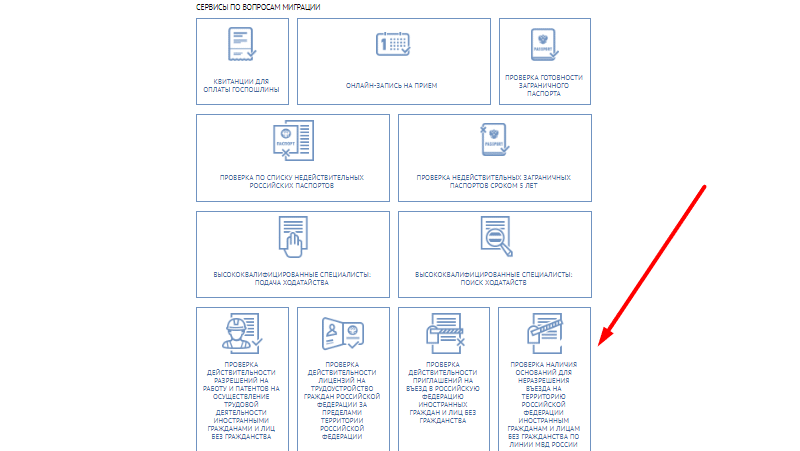
First select “Useful services of the Ministry of Internal Affairs”, and then “Services on migration issues” on the website.
On the page that opens, you need to enter all the requested data, and the system will give you an answer. This option for checking the deportation of foreign citizens is for informational purposes only. That is, no one guarantees the relevance of the data produced by the system.
How can you find out if a person has been deported from Russia in this way? The foreigner must personally submit an application to the local branch of the former Federal Migration Service. This can be done through an intermediary, to whom a power of attorney has been issued. The answer will come to you by email, in writing.
There are two types of restrictions:
- Entry ban from the Russian Federation;
- Resolution on the unwanted stay of a foreigner in the Russian Federation.
The reasons for the ban may be different, but usually they are associated with a violation of Russian legislation: It happens that restrictions are imposed for security reasons and for the purpose of defending the country. Cancellation In some special cases, deportation is canceled.
Russia, from which deportation is discussed in the article, adheres to the following rules for the deportation of foreign citizens: After the court verdict, you can file an appeal to appeal the decision within ten days. Payment This section deals with payment for relocation after a decision to deport foreign nationals. Duration of entry ban Restrictions for 3 years await a foreigner if he:
- Was illegally in the country for more than 120 days or more;
- He was brought to administrative responsibility at least twice.
A ban for 5 years is possible under the following circumstances: Deportation or expulsion for the second time will restrict entry into the Russian Federation for 10 years.
Removing entry restrictions There are two options for entering Russia: legal and not entirely.
The first implies the abolition of the ban in the legal field.
The second one is often used by illegal migrants.
Get expert help by clicking on the link. A.I. Sokolov about superfluidityEl gran misterio del DILUVIO UNIVERSAL HISTORIA,DOCUMENTALES INTERESANTES,documentaries,HISTORYThe Great War.
Information about the entry ban and lists of citizens subject to deportation can be found on the official website of the FMS.
Foreign citizens sometimes have to deal with the phenomenon of deportation.
Moreover, this trouble does not at all mean that a person is forcibly put on a plane or taken to the nearest border in handcuffs and expelled. Most often, the violator himself has to leave the country within the established time limits. To use it you need:
- go to the service page;
- enter all required passport data in the fields;
- enter the security code shown in the picture;
- click the “Send request” button.
After automatic processing of the result, a line will appear on the page where it is written whether the FMS has grounds for a ban on entry into Russia.
Many may have questions about whether it is possible to return. For some reasons, it is not always possible to find out this in the process. To inform foreign citizens about the existence of an entry ban, the Federal Migration Service has launched a special online service.
More on the topic: We analyze the pitfalls of the Pyaterochka Pochta Bank card - the possibilities of a personal account
This also answers the question of whether the person was deported or not.
A migrant who has been subject to deportation proceedings is prohibited from entering Russia for 3 or 5 years.
You can read about how to check the readiness of Russian citizenship in this article. If a foreigner’s documents have already expired, then he has 15 days to leave the Russian Federation.
Other grounds for deportation:
- staying in Russia with invalid documents;
- illegal crossing of the Russian border;
- violation of the rules for foreigners to stay in the country.
The following categories of citizens are prohibited from undergoing this procedure:
- refugees;
- those who submitted a request for watering.
shelter; - diplomats;
- residents of countries where fighting is taking place.
Expulsion is carried out after such a decision is made in court. Lists of those deported from Russia are then stored in the Main Directorate for Migration of the Ministry of Internal Affairs (formerly the Federal Migration Service) so as not to allow back citizens who are subject to such a sanction. You can read about how long it takes for a claim to be considered in court here.
Can it be recalled? Read more about this here.
You can appeal such a decision, but only immediately after it is made. 10 days are provided for this.
Deportation is carried out at the expense of the foreigner himself; the organization or person who issued the invitation to him; dip. the institution to which it belongs, or the state itself. The last option is only possible if the first three are irrelevant.
Cancellation of deportation is possible in the same cases as an entry ban. It is described in detail in this article.
This can be done online, on the website of the Main Directorate for Migration Affairs of the Ministry of Internal Affairs, or by sending a request there. In fact, the procedure is the same as what you need to follow to find out if you have a ban on entry into Russia.
You need to go to the official website of the Main Directorate for Migration of the Ministry of Internal Affairs of Russia and find the appropriate service there.
Persons without any nationality or foreigners may be subject to deportation if they violate Russian laws.
This is expulsion from the country with sanctions such as a ban on entry into the country for 3 or 5 years.
What to do to avoid being deported Foreign citizens sometimes have to deal with such a phenomenon as deportation. Moreover, this trouble does not at all mean that a person is forcibly put on a plane or taken to the nearest border in handcuffs and expelled.
Most often, the violator himself has to leave the country within the established time limits.
Many may have questions about whether it is possible to return. For some reasons, it is not always possible to find out this in the process.
This also answers the question of whether the person was deported or not.
How can you check the “black list” of migrants of the Russian Federal Migration Service? How do people get on this list? What are the distinctive features of this area of the country’s migration policy today?
Deportation is a measure of influence applied to foreigners who violate Russian migration legislation. As a rule, this applies to illegal labor migrants, who mostly come from Central Asian countries and the Republic of Moldova. The use of such measures implies a ban on entry into the Russian Federation in the future.
Not all foreigners who are ordered to leave the country are required to follow it. So, you cannot deport:
- Politicians;
- Foreigners who have been assigned the status of emigrants;
- Political emigrants;
- Foreigners who have applied for emigrant status;
One of the following categories of persons must finance the “expulsion” procedure from the country:
- Citizens/organizations for the reason of which the foreign person arrived on the territory of the Russian Federation;
- Representatives of the foreign state from which the citizen arrived;
- The foreign citizen himself;
- Federal Migration Service of the Russian Federation.
The last authority assumes the costs only as a last resort if all previous ones ignore the fact of deportation of a foreign person.
about the author
Alexander Eremeev
Experience as a lawyer - since 2005. Graduated from the Moscow State Open University with honors. Private practice, specialization - migration and civil law.
The procedure for migration control on Russian territory is regulated by the legislative framework of the Russian Federation, in accordance with which foreign citizens are subject to supervision by territorial authorities on migration issues. Measures for registration, control and deportation of citizens of other states are a mandatory condition for the stay of migrants on Russian territory.
Problems with employment caused by the unhealthy economic situation in the CIS countries force their citizens to come to Russia in search of income and the opportunity to provide financial assistance to their loved ones.
Unfortunately, not all migrants are ready to follow the norms of Russian legislation. Evasion of migration registration and violation of terms of stay are not the only reasons leading to deportation.
Being far from home and the lack of fear of judgment from relatives left at home dulls the consciousness of migrants. In search of “easy money” and the desire to try on the life of a successful person, guests of the Russian state, without hesitation, commit crimes. The prospect of being deported or expelled from Russia scares not all foreigners.
For foreign citizens who want to check deportation or verify its absence, the following methods are available:
- online deportation check. If it is possible to use Internet services, citizens should go to the official website of the Main Directorate for Migration Issues of the Ministry of Internal Affairs of the Russian Federation, fill out the form provided and send a request. It is possible to receive information about your request as a result of an online check within 24 hours. It should be taken into account that information obtained through remote access is for reference only and has no legal force.
- If there is a need to obtain legally significant information, foreign citizens will have to make a personal visit to the territorial division of the Ministry of Internal Affairs of the Russian Federation (FMS) and receive the requested document on paper.
- It is also possible to receive an official response using postal services. When sending a request to verify deportation to the migration service, you must indicate your full details and the address to which a response is expected.

